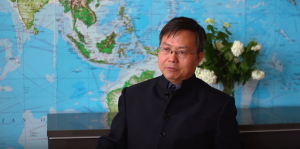The “Exotic” Minority in Western China: Why Domestic Ethnic Tourism in China May be Doing More Harm than Good
Memo #241 By Brianna Botchwey – blsb2 [at] cam.ac.uk In western China, domestic tourism is on the rise and ethnic tourism is a central but troubling part of this industry. While tourism may provide poorer, minority areas with income, the increase in ethnic tourism is a problematic development for the future of relations between China’s Han […]
Best Practices Guidelines: Chinese Energy Investment In Canada
Xu Xiaojie, Director of World Energy at the Institute of World Economics and Politics at the Chinese Academy of Social Sciences discusses the relationship between Chinese and Canadian energy companies, and the motivations behind Chinese investment in Canada.
Unhealthy Rituals: How to Address the Occupational Health Hazards of Doing Business in China
As China’s economy has grown, so has its burden of disease. Excessive practices of smoking, drinking and eating, along with a growing commercial sex industry, are leading to epidemics of cancer, diabetes, stroke, other cardio-vascular diseases and sexually transmitted infections. Something must be done about this before it threatens China’s economic growth, but the response must fit the problem.
China in Global Governance (Video Interview with Professor Gerald Chan)
Memo #230 Featuring Gerald Chan – gerald.chan [at] auckland.ac.nz Professor Chan, of the University of Auckland, discusses his research on China in global governance. He describes Chinese involvement in world affairs as a new phenomenon, which began with Chinese reforms in the 1980s. This period saw increased interaction between China and other states, and between […]
Chinese Companies Moving into the World Market… Responsibly?
Two decades after it began opening up to the world, China devised the “Going Out” strategy in the late 1990s to encourage Chinese companies to operate on a global scale. China’s outbound direct investment (ODI) has surged, reaching a staggering total of US$68 billion in 2010—over five percent of global FDI flows. Chinese ODI has targeted all sectors of the world economy, with a marked presence in the resource and infrastructure sectors, and in developing regions like Africa and Southeast Asia where bilateral and multilateral partnerships with the People’s Republic are deepening.
China and the Global Order (Video Interview with Professor Rosemary Foot)
Chinese conceptions of global order are neither well defined nor agreed upon. Many Chinese intellectuals debate what Chinese preferences should be regarding a global order, and the future role of China within it. These scholars are putting forward new ideas often based on Confucianism or Chinese historical experience. However, this academic debate is not reflected in government statements or policy. We see no clear promotion of a coherent concept of a global order, differing from what we currently see, articulated by the Chinese government. What is clear is that China seeks more voice and more representation. Issues such as G20 membership are increasingly important to China. There may be revisions around the edges of Chinese global preferences, but China overall is not demonstrating that it is a dissatisfied power.
Journalism in China: Impacting Policy in a Changing Media Landscape (Video Interview with Melissa Chan)
Currently a John S. Knight Journalism Fellow at Stanford University, and former China correspondent for Al Jazeera, journalist Melissa Chan discusses the changing media landscape in China and the role played by foreign correspondents.
Gender and Ethnic Tensions in Western China
The March 2013 sentencing of 20 Uyghur men in Xinjiang, China, on terrorism- and separatism- related charges highlights ongoing frictions in China’s far west. Amid China’s media censorship and practice of conflating some peaceful resistance or ordinary crimes with terrorist activities, full details of these events remain unknown. What is clear is the persistence of ethnic tensions, also illustrated during protests and riots in the region in 2009.
Lotteries vs. Auctions: China’s Experiments in Managing Automobile Growth
The astronomical growth in the number of private cars in China has led to very visible environmental crises and congestion. But the nationwide increase conceals crucial policy differences between cities that influence effectiveness, revenue, efficiency, equity and public acceptance. While Shanghai and Beijing each had approximately 2 million motor vehicles in 2004, by 2010 Beijing had 4.8 million versus Shanghai’s 3.1 million. By 2011, 38% of Beijing households were vehicle owners in contrast to 18% in Shanghai. Two decades ago Shanghai opted for a monthly license auction to control vehicle ownership, while Beijing had few controls over usage or ownership until the run up to the 2008 Olympics.
Overhauling China’s Organ Transplant System
At a WHO conference in 2005, China’s vice-minister of health Huang Jiefu became the first public official to admit the country’s reliance on organs from executed inmates, and promised a transition to a voluntary donation system. A pilot for such a system has established a donation network set to expand this year, fixing the disorderly arrangements that have long been criticized by international health and human rights organizations.









